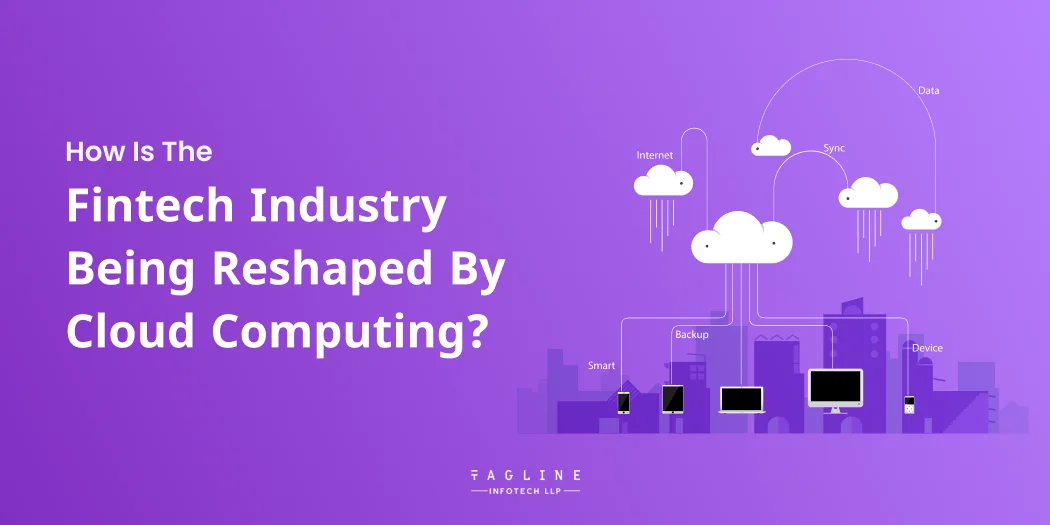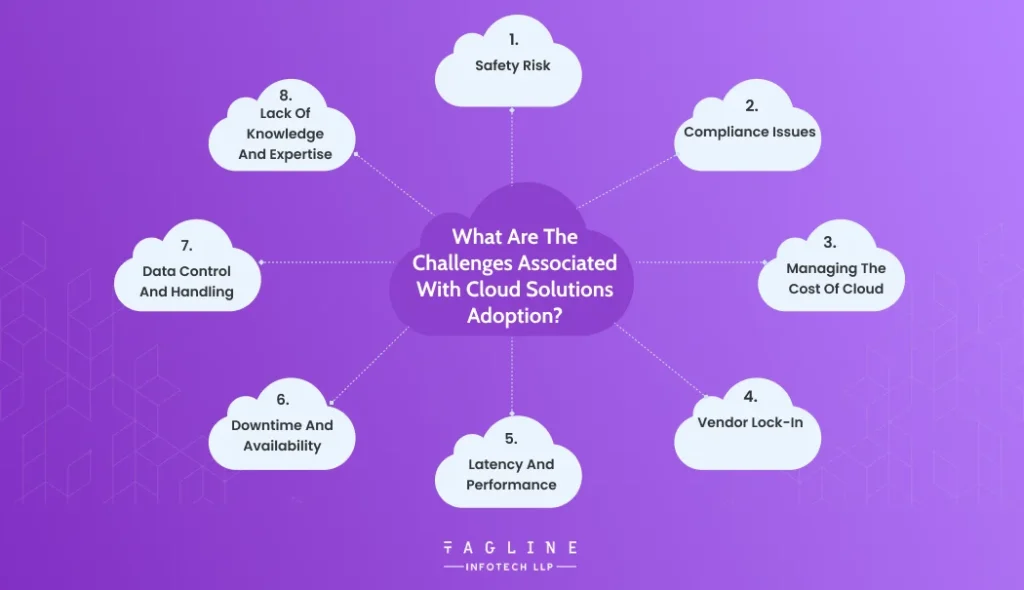Are ReactJS developers in high demand in the...
April 10, 2025
Home >> Cloud Computing >> How is the Fintech Industry being reshaped by cloud computing?

Quick Summary
Doing paperwork and looking for in-depth knowledge about the financial terms and also hovering from one bank branch to another is long gone. Cloud computing technology is getting deeper into the fintech industry and is the reason behind its rapid transition in today’s era.
Not only is cloud computing changing how we save our digital photos, papers, and data, but it’s also completely changing the financial landscape. You will see that it is very capable of data storage, processing and sending it to financial services.
Cloud computing refers to the category of technology that can help companies, users and various other entities access and use a lot of services and resources via the internet. Instead of storing the data on local servers and computers, the data will be held on the cloud.
While using the cloud services, the users are allowed to access the shared resources being managed by many cloud service providers, which are stored in varied data centres. Fintech cloud computing also minimizes the usage of expensive server upkeep, acquisition, and installation.

IaaS
A cloud computing architecture called Infrastructure as a Service, or IaaS, provides virtualized computer resources like networking, storage, and virtual machines. More control over the operating system and apps is given to the user.
PaaS
A type of cloud computing known as Platform as a Service, or PaaS, offers an environment and a framework for the development, testing, and deployment of software applications. Developers may concentrate on writing code as the Platform manages the underlying Infrastructure.
SaaS
Software as a Service (SaaS) is the term for cloud services that offer fully working software applications. Installing the Software locally is no longer necessary because users can access it using a web browser.
Cloud computing has given smaller fintech startups and larger financial institutions the tools to transform their operations and work processes and increase efficiency. They don’t need to make a sizable upfront financial commitment to utilize robust computers and services thanks to technology.
Therefore, to compete with respectable industry leaders, businesses can rent what they need from the cloud rather than making a significant upfront investment in pricey hardware and Software.
“Edge Computing vs Cloud Computing: What’s the Difference? “
– Also Read Article

With its technical advancements and innovative approach clo, UD computing is reshaping the fintech industry. Here are some of the best cloud computing transformations that can help you know how it has propelled the Fintech industry:
Fintech organizations can now manage varying volumes of data thanks to cloud computing, which also eliminates blind spots produced by data silos and provides clean, well-organized, contextualized data structures.
Fintech organizations may also do real-time data analysis and processing thanks to cloud-based data processing tools and platforms. Numerous professions require this ability, including algorithmic trading, data management, fraud detection, risk assessment and mitigation, and compliance monitoring, to name a few.
Application programming interfaces (APIs) and tools for merging data from several sources are also provided by cloud platforms. Fintech companies can now obtain comprehensive insights by combining data from multiple sources.
Since cloud service providers base their pricing on subscriptions rather than one-time costs, fintech organizations only pay for the resources and services they genuinely use. This facility eliminates significant upfront capital expenditures for hardware and infrastructure.
Furthermore, multi-tenant architecture is used by cloud services to allow multiple users to share a single physical infrastructure. The fact that cloud services are hosted remotely makes this possible.
Cloud service providers, who manage data centres across the globe and geographically disperse their services, allow the financial technology sector to leverage this global infrastructure.
It accomplishes this while maximizing resource utilization and guaranteeing latency-free customer access across several locations. Users of cloud platforms have access to automation features, which help financial companies allocate their resources as efficiently as possible.
For example, companies can instantly start or stop virtual servers according to their needs and preferences, ensuring the best use of available resources without requiring human intervention.
Large volumes of data can be managed by enterprises using cloud services’ scalable storage options, which do not require expensive on-premises hardware. With cloud services, businesses can now store and manage enormous volumes of data.
Fintech companies can expand their cloud storage capacity while handling massive volumes of data. Businesses can reduce their storage capacity when things go wrong, which lowers costs.
Fintech organizations can quickly scale up or down their operations by utilizing cloud computing. Furthermore, cloud services enable secure data access from any point globally with a working internet connection.
Regardless of their precise needs or geographic location, clients and professionals in the fintech sector may get the financial data and services they need.
Cloud service providers use various safety measures, including auditing, monitoring, threat detection, data encryption, data residency, data encryption, and security patching, to enforce strict safety regulations and prevent possible disasters.
Built-in security procedures enable enterprises to ensure the most outstanding operational safety while safeguarding sensitive personal and financial data.
Furthermore, cloud computing provides options for automated data backup and recovery in an emergency. Fintech organizations may ensure the integrity of their data and business continuity by regularly backing up their data to the cloud and promptly recovering it in case of disruptions.
Explore the transformative impact of cloud computing on the Fintech sector.
Let’s build the Innovation together by connecting with our skilled developer team and create groundbreaking solutions.
Nowadays, the growth of FinTech companies can be seen as they are adopting cloud computing. The technologies have much more to offer in upcoming years. The transformation of one to another can be seen in many ways. Here is a glimpse for you:
Also called a function as a service, it is a kind of cloud computing. The model allows the developers to run and build apps without the management of the underlying infrastructure. It is much better than any server-based approach and enables the developer to manage their server, maintain them and handle their scalability for running apps.
These serverless functions are considered stateless as they do not maintain information and work well between invocations. The required state can be stored in their devices or various external databases.
The various serverless functions are mainly designed for running just for a short interval and also measured the same for a few minutes online. Long-term procedures are very suitable for various computing models.
Kubernetes and Containerization is one of the emerging kinds of computing technology that can help developers in packaging the app along with its many dependencies, inclusive of libraries, runtime environment, configuration, etc, in a single unit, also known as a container. They are isolated from each other and share the same operating system, which makes them efficient and lightweight.
If you are talking about Kubernetes, it is one of the open-source container platforms for keeping up with automated containerized application management, deployment and scaling. It also offers many features for extensibility, rolling updates, service discovery, self-healing, scaling, load-balancing and container orchestration.

Undoubtedly, utilizing the cloud provides many advantages that take time to enumerate. However, fintech companies may run into their own unique set of challenges and roadblocks when implementing it, just like any other technology. The following are some challenges that come up most often when using cloud computing.
There is an inherent security risk when using cloud computing, and this risk might include data breaches, illegal access, and data loss. Furthermore, the fact that cloud service providers might keep data across multiple locations creates concerns about data management procedures, data sovereignty, and ethical use.
Ensuring one complies with the regulations set forth by the authorities is another cause for concern. Cloud services provide compliance certification as a fix for the issue.
On the other hand, fintech organizations may face legal and financial ramifications if the certificate is not compliant with regulations like GDPR, PCI PSS, and others.
Cloud computing expenses can rise quickly without adequate oversight and control, which could result in budget overruns that cause losses rather than gains.
Fintech companies choosing a cloud services provider face many challenges in adopting cloud computing, such as selecting the right type of cloud, understanding the price structure, creating budgets, and assigning and tagging resources.
Fintech businesses run into issues when they depend too much on the products and services provided by several cloud providers. Transferring apps and data between providers in this scenario can be difficult, time-consuming, and occasionally costly.
Data must travel over large distances to get from the cloud to the end users, which can impact responsiveness, among other things, as well as latency and network performance issues. Fintech organizations may often face these issues if they fail to make a well-informed strategic choice about the cloud region and fail to take content delivery networks (CDNs) into account.
Disruptions may occur for cloud service providers, interfering with organizations’ regular operations. If businesses don’t set up redundancy and failover procedures, they could end up with service interruptions and downtime.
There may be a loss of control over the underlying technology and the data it holds when moving to the cloud. Businesses operating in the financial technology sector are vulnerable to data misuse, illegal access, and security breaches if they do not have established governance guidelines and controlled access.
With time, the intricate ecosystem that underpins cloud computing will continue to evolve. Many businesses need more knowledge and expertise to handle cloud systems efficiently. To succeed in the cloud, managing cloud architecture, security, networking, and cloud-native development requires particular skills.
Fintech enterprises that employ cloud computing are susceptible to substantial financial losses if they lack access to a skilled labour pool. A crucial part of the process is successfully adopting cloud computing, which involves careful planning, ongoing oversight, and the capacity to adapt to a constantly shifting cloud environment.
Working with a trustworthy fintech cloud services provider that employs cutting-edge techniques and technological solutions to minimize risks is your only option.
Yes, cloud-based services are revolutionising the fintech industry. With the enhancing client experience, security, scalability and data insights, these Fintech companies can dig deeper into new services and be competitive.
Nowadays many Fintech companies are thinking about using cloud computing in their business because it has many advantages like seamless management of data, resource optimization, flexibility, scalability, and many more.
In this modern world, you should think about using some of the most popular cloud services like AWS KMS, Azure Key Vault, Google Cloud Security Command Center, and many more for Fintech businesses.

Digital Valley, 423, Apple Square, beside Lajamni Chowk, Mota Varachha, Surat, Gujarat 394101
D-401, titanium city center, 100 feet anand nagar road, Ahmedabad-380015
+91 9913 808 2851133 Sampley Ln Leander, Texas, 78641
52 Godalming Avenue, wallington, London - SM6 8NW